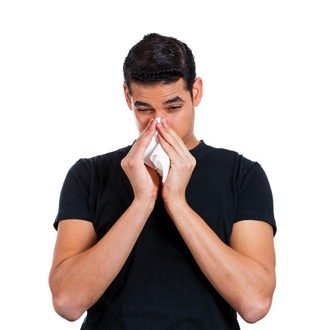Natural antihistamine relief when you have Hashimoto’s

If you dread allergy season, then you know what it’s like to suffer from itchy skin, red eyes, a runny nose, sneezing, sinus pressure, and headaches.
Likewise, you may react to certain foods with hives, headaches, nasal congestion, skin problems, a racing heart, or irritability.
What is the common denominator in both scenarios? Histamines.
When you’re working to manage Hashimoto’s hypothyroidism, histamine reactions are a foe in battle because they are so inflammatory.
While many people just give up and suffer, some natural compounds can bring relief. To understand why these natural remedies work, it’s helpful to understand a bit about histamines.
What are histamines?
Histamine is a protein that causes inflammation, redness, and irritation. It is produced in response to environmental or dietary proteins, also known as antigens.
When the antigen comes into contact with the body, the immune system registers it as an intruder and produces antibodies to it. These antibodies cause a release of histamine into your bloodstream, where they can build up with repeated exposure and increase sensitivity.
Histamines are found in many common foods, especially those aged or fermented, such as aged cheese, red wine, and sauerkraut, and also in foods such as eggs, some fruits and vegetables, and some seasonings.
Chronic histamine reactions can make it harder to manage Hashimoto’s hypothyroidism as you’re constantly dealing with inflammatory reactions.
Natural antihistamines when you have Hashimoto’s
The bright side is that there are a number of natural ways to ease your suffering, whether it’s from seasonal allergies or high-histamine foods.
These approaches will not only work on histamine reactions, they can also help better manage Hashimoto’s.
First — Lower overall inflammation in the body
Before looking at natural antihistamines, it’s important to first address a functional medicine foundation: adopting a diet and lifestyle to lower overall inflammation.
This includes removing foods to which are intolerant (gluten and dairy are most common), stabilizing blood sugar, repairing intestinal permeability, managing low thyroid function and hormone imbalances, and addressing chronic stressors, such as sleep deprivation, over training, toxic exposures, junk food, excess alcohol, and many more.
This is the exact foundation for managing Hashimoto’s hypothyroidism, an autoimmune thyroid disease.
Quercetin — nature’s Benadryl with Hashimoto’s
Quercetin is a bioflavonoid with anti-oxidant, anti-inflammatory and antihistamine properties.
It also gives both short-term relief and long-term gut repair so you’re you less susceptible to allergies.
This can likewise be helpful in managing Hashimoto’s.
Nettles
Nettle leaf is a natural antihistamine that naturally blocks histamine production. It can be made in to a tincture or tea, but for allergy relief, capsules made from dried nettle leaves are the most effective option.
Butterbur
The European herb butterbur has been shown to rival leading OTC drugs in reducing histamine reactions. It’s an anti-inflammatory properties also reduces spasms in smooth muscle and relaxes swollen nasal membranes.
Mangosteen
Mangosteen is a fruit extract that has been shown to reduce inflammation and inhibit histamine release.
Ginger
This Asian medicinal plant has been shown to inhibit histamine production.
Ask me about natural antihistamine relief and managing Hashimoto’s hypothyroidism
These are just a few of the many compounds effective in reducing histamine reactions. You can benefit from the synergistic effect of these compounds working together in product formulations that combine them.
If you have Hashimoto’s hypothyroidism and seasonal allergies or react to foods, contact my office. I can help you determine the source of your symptoms and get you on the path to feeling better.
4 Comments. Leave new
Hello. I thought quercetin inhibits thyroid function.
I was under the same impression. Can somebody clarify the effects of quercetin and the thyroid.
I am also interested in the safety of quercetin use in Hashimotos.
I know Dr. Datis Kharrazian uses it with his Hashimoto’s patients to help them recover from histamine issues. He has said the problem with some studies that isolate one mechanism is it doesn’t take into account a much more complex and interrelated system. But it’s best to monitor your symptoms if you take it.